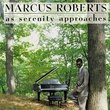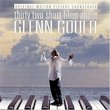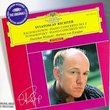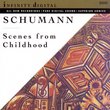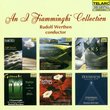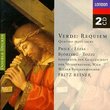| All Artists: John Shirley-Quirk, Ralph Vaughan Williams, Andre Previn, London Symphony Orchestra, Heather Harper Title: Vaughan Williams: The Nine Symphonies [Box Set] Members Wishing: 0 Total Copies: 0 Label: RCA Release Date: 3/9/2004 Album Type: Box set Genre: Classical Styles: Chamber Music, Forms & Genres, Concertos, Theatrical, Incidental & Program Music, Historical Periods, Classical (c.1770-1830), Modern, 20th, & 21st Century, Instruments, Brass, Strings, Symphonies Number of Discs: 6 SwapaCD Credits: 6 UPC: 828765570824 |
Search - John Shirley-Quirk, Ralph Vaughan Williams, Andre Previn :: Vaughan Williams: The Nine Symphonies [Box Set]
![Vaughan Williams: The Nine Symphonies [Box Set]](/images/no_cover/l.png?v=a4e11020) | John Shirley-Quirk, Ralph Vaughan Williams, Andre Previn Vaughan Williams: The Nine Symphonies [Box Set] Genre: Classical
|
CD DetailsSimilarly Requested CDs
|
CD ReviewsDefinitive Vaughan Williams Collection at rock bottom price R. Lane | Tracy, CA USA | 03/13/2004 (5 out of 5 stars) "This collection is an incredible bargain! Many of the recordings in the box are unmatched by any of the competition (Antarctica, Tuba Concerto, Symphony #6 especially). And not a single recording disappoints. The recorded sound is outstanding by any standards. I could not get any interest in Vaughan Williams for years. I remember exploring the EMI Boult recordings in the late 1970s. I was bored, to say the least. Then when RCA reissued these recordings individually in the late 1980s, I bought the Antarctica and gave it a try. I got hooked from there, and bought all of the rest one at a time. I couldn't believe how vibrant, exciting, and enjoyable the performancs were. And for the price, this box is a must for anyone even remotely interested in Vaughan Williams. You get all the symphonies and more, for less than the cost of 2 full price CDs. The booklet is decent also." Comprehensive and Impressive Collection Dr. Christopher Coleman | HONG KONG | 04/07/2004 (5 out of 5 stars) "Listen to the bold beginning of Ralph Vaughan Williams' A Sea Symphony, and you've captured the essence of VW at his best. This is the first of 9 symphonies by a composer who is surely England's greatest Symphonist. His essays in the form span the first half of the twentieth century, but include few of its radical elements. Vaughan Williams was a traditionalist throughout, and surely it was that conservative outlook that drew him to the symphonic form in the first place. Listening to his second symphony, A London Symphony, one hears typical Vaughan Williams-almost entirely melodic in its conception, with lots of diatonic, modal or pentatonic writing, and a touch of chromatic harmony to flavour the melody. It's beautiful, and the music spans a wide emotional gamut from intense introspection to joyous celebration. Only in the 4th Symphony does VW really open himself to a more contrapuntal and dissonant style, and the consequence is that the composition becomes quite reminiscent of Prokofiev or Schostakovich, the two other great Symphonists of the time. Following the 5th Symphony, however, I feel that VW's artistic output suffers. The later pieces, with the exception of the 7th Symphony, Sinfonia Antarctica-based on music he'd composed for the film Scott of the Antarctic--lack the vigor and excitement of the earlier works. They're more introspective, perhaps as befits an older composer, but they don't speak to me as strongly as, say, the later symphonies of Mahler or Schostakovich. Perhaps it is that VW was resistant to change in his basic musical outlook, but by the 1950's, the diatonic/pentatonic ideas he frequented had become increasingly irrelevant. That VW was brilliant and a master craftsman is unquestionable, but he seemed to need new fuel for his compositional fires and was unwilling to consider the atonality of Schoenberg and his followers, the rhythmic vitality of Stravinsky and Bartok, or even the orchestral colours and dramatic juxtapositions of Gustav Mahler. There are still many moments of brilliance, but as a whole the later works move me less.All of the performances by Andre Previn and the London symphony Orchestra are superb-no one plays this music better. With 9 Symphonies and four other orchestral works-the Concerto Accademico, the Tuba Concerto, the Wasps Overture, and Three Portraits from The England of Elisabeth-this collection is packed with value, and I can scarcely do it justice in the limited room I have. While the Concerto Accademico seems aptly titled and not terribly engaging, the Three Portraits are a gem of VW's work for television. Its worth the price for the first two symphonies and the Sinfonia Antarctica alone, everything else is just gravy--or perhaps I should say, baked beans on toast! All in all, a terrific deal." Can't get any better Martin B. Haub | Gilbert, AZ United States | 07/19/2004 (5 out of 5 stars) "If you've ever thought of getting all of the RVW symphonies but haven't, because of cost or what not, there are no more excuses. This is the best set ever. Previn and the LSO had a magical relationship 30 years ago, and no one has ever done these symphonies better. If you find some of them tough nuts to crack, don't worry; RVW isn't easy music, but it is well worth it. It's not supposed to be simple. The only caveat: analog sound. Now RCA was capable of great sound in the 1970's, and the sound is frankly better than the newer RCA series with Slatkin. But if superb digital sound is paramount, you won't go wrong with Handley's set with Liverpool. It's another top notch cycle. Still, I rate Previn tops in this music. RCA is to be commended for releasing this set, as well as the others in the series...check them out!"
|

 Track Listings (4) - Disc #1
Track Listings (4) - Disc #1
